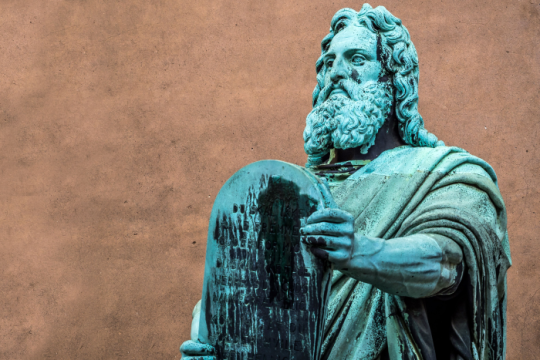
My wife, a teacher, told me about a recent conversation she had with a grandfather of Armenian descent. He told her how repulsed he felt after seeing a magazine image depicting a person with a beard breastfeeding a baby. He asked her if his reaction wasn’t proof that such behavior is unnatural.
“I disagree with the notion that being repulsed by another human is an inborn reaction., my wife replied. “It is socially acquired. Look how the Nazis dehumanized the Jews to pave the way to genocide, and how the Turks did the same to your people.”
After reflecting for a moment, he said, “Your people gave us the Ten Commandments. Do you think the world would be a better place if they were followed?”
“Yes,” she answered.
“Me too,” he replied.
Indeed, a stricter adherence to the biblical Ten Commandments, the ethical foundation of Western religious thought, might be just what America needs to restore trust in government and a semblance of civility in political discourse.
Five of the commandments concern our treatment of neighbors: You shall not murder, commit adultery, steal, bear false witness (shaker, meaning “tell a lie” in Hebrew), or covet. Yet given how commonplace it has become for people to be unfaithful to their spouses these days – both in life and on screen – and how frequently we mouth falsehoods, it may be difficult to understand why Jewish law places these more common transgressions on par with murder and stealing.
In fact, the ninth commandment – “You shall not bear false witness” – is one of the most grievous of sins because it stands at the very core of Jewish ethics.
Many acts are prohibited in the Torah, writes Rabbi Joseph Telushkin in A Code of Jewish Ethics, but “falsehood is the only sin that the Torah commands people to avoid actively: ‘Stay away from falsehood.’ (Exodus 23:7).” He adds: “The Talmud designates habitual liars as so hateful to God that ‘the speaker of falsehood shall not stand before My eyes’ (that is, will be denied a place in the World-to-Come. (Sotah 42a and Sanhedrin 103a).”
The sages of the Talmud also taught that the world rests on three things: truth, justice, and peace – and that the three are really one, for when justice is done, truth prevails and peace is established (Taanit 4.2).
The Torah: A Modern Commentary explains that the ninth commandment “addresses itself to the character of a person. The Hebrew text does not speak of false testimony, but of a false testifier. Liars infect both themselves and the social fabric, and when they practice their deceit, the damage is doubly destructive. ‘Everything in the world was created by God,’ says a midrash, ‘except the art of lying.’”
In political terms, candidates and their surrogates who fabricate the truth are undermining the common good. The same may be said of their adherents who turn a blind eye to falsehoods in the belief that the end justifies the means. In Judaism, the means matter; each action we take is judged on its own merit
For the good of society, we need to be watchful of these four telltale tactics in the liars’ toolbox:
- Beware of those who excuse small lies. As Albert Einstein observed in Einstein on Peace, “Whoever is careless with truth in small matters cannot be trusted in important matters.” Conversely, “A little truth overcomes much falsehood, as a little light dispels much darkness” (Bahya Hobot HaLebabot, 1040, 5.5).
- Beware of statements that are partially true, for as the Yiddish proverb says, “A half truth is a whole lie.”
- Beware of the tactic used to devastating effect by Joseph Goebbels, Hitler’s propaganda chief: “If you tell a lie big enough and keep repeating it, people will eventually come to believe it.” As early as the 12th century, the great Jewish philosopher Maimonides warned, “A truth does not become greater by frequent repetition” (Tehiyat HaMethim. Responsa ii, gd.).
- Beware of anyone who claims to know the absolute truth without providing scientific evidence, for as Arthur Koestler reminded us in his 1941 novel, Darkness at Noon, “The ultimate truth is penultimately always a falsehood.”
If elected officials hope to regain the trust of the American people, especially young voters, a culture of truth must be restored to keep our democracy strong.
Personal allegiance to the ninth commandment is a good way to begin.



